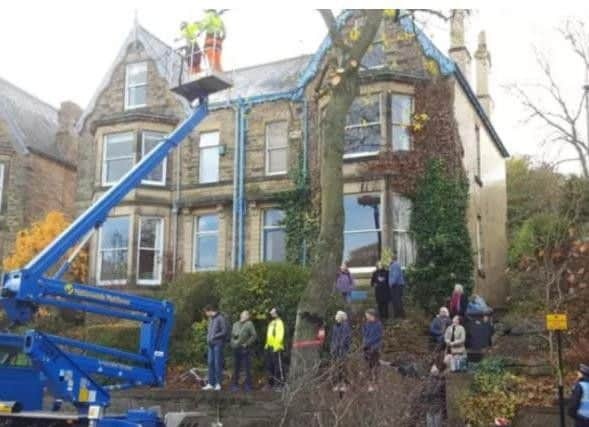Woodland Trust attacks Sheffield Council over 'suspicious' tree secrecy
The Woodland Trust, the UK’s largest woodland conservation charity, is seeking talks with the Labour-led council and its new cabinet member for environment Lewis Dagnall, who has taken over responsibility for overseeing the felling programme.
It comes after The Yorkshire Post revealed on Saturday that the council was refusing to release details of its annual tree management programme for 2017/18 on the grounds that “increasingly intimidating and at times violent” behaviour by campaigners means publishing the information would risk the safety of both contractors and the public in areas where felling is due to take place.
Advertisement
Hide AdAdvertisement
Hide AdSheffield Council blames 'violent' protesters for tree secrecyAccording to the council’s £2.2bn Streets Ahead highways maintenance contract with private firm Amey which started in 2012, the replacement of trees with new saplings has to be done “in accordance with the annual tree management programme”. It was revealed earlier this year that the contract details that not less than 200 trees per year should be removed so that 17,500 of the city’s 36,000 street trees are replaced by 2037. Almost 6,000 have been removed so far.


The work has been on hold for more than two months while a review of felling practices takes place following a national outcry against the policy and the use of dozens of police officers and private security guards in supporting operations.
Joe Coles, The Woodland Trust’s project lead on the issue, said: "It seems Sheffield is only prepared to inform its citizens of tree felling and replacement after the event. We do not condone violent protest, but the vast majority of Sheffield residents have held the council to public account through tireless, peaceful efforts.
“Let’s remember these are not state secrets. This is about felling and planting trees. Any amount of secrecy raises further suspicion. In light of previous information released through FOI, it seems that residents must unfortunately remain apprehensive of their council’s intentions.
Advertisement
Hide AdAdvertisement
Hide Ad"We work with many positive councils and communities who value their trees, demand their protection, and are only too happy to receive our support.
“Once again, we invite Sheffield City Council to meet with us and discuss a way forward. We’d particularly like to hear from the new council member for the environment Lewis Dagnall."
The council also rejected requests to see the annual tree management programme for the years between 2012 and 2016 on the grounds that it intends to publish this information at an unspecified future date.
It comes after another key element of the contract, the Highway Tree Replacement Policy, was revealed by The Yorkshire Post last month following a separate Freedom of Information battle with the council.
Advertisement
Hide AdAdvertisement
Hide AdThat showed the replacement policy focuses on minimising maintenance costs for new saplings while containing no mention of existing trees only being replaced as a “last resort” as the authority’s leaders had repeatedly claimed in the past.
The approach of other councils’ tree management - planting and felling - was the subject of an investigation by the Sunday Times this weekend and placed Sheffield in third place behind Newcastle and Edinburgh for number of trees felled since 2015.
But Mr Coles – a former local authority technical officer - said the article should not put the actions of Sheffield in a more favourable light as the statistics offer no means for accurate comparison as there is currently no standardised method of official reporting.
He said: “The figures reported in the article, while absolutely alarming, should be taken with a measure of understanding. There are many reasons why trees are felled. When planting new woodland for example, trees are planted in their thousands on the understanding that not all of them will survive and it is common practice to remove a percentage for the remaining to thrive.
Advertisement
Hide AdAdvertisement
Hide Ad“Sheffield City Council appears at number three in the list, behind Newcastle and Edinburgh. Yet the number stated for Sheffield is only how many street trees have been felled. The other councils in the list may well have included normal woodland management figures in their felling.
“Sheffield City Council went to war with its street trees in 2012 removing healthy mature trees from residents doorsteps – entering a 25 year PFI contract that locks the council into delivery. Meanwhile we believe Newcastle aims to adopt a tree strategy to clearly show how it will manage its canopy cover in the future, and Edinburgh is looking at potential locations to see how it can increase its tree asset. Both positive positions to adopt, but both appear on this list.
“Without the full picture it is hard for us to comment on reasons for felling in any of these councils – save Sheffield where there is evidence that tree felling is not in many cases necessary.”
It comes as four tree campaigners are due in court tomorrow as Sheffield Council takes legal action against them for allegedly breaching the terms of an injunction banning ‘direct action’ protests involving standing directly under threatened trees. The case is due to last three days and could result in the accused campaigners being jailed or issued with fines.
No one from Sheffield Council was available for comment when contacted by The Yorkshire Post today.